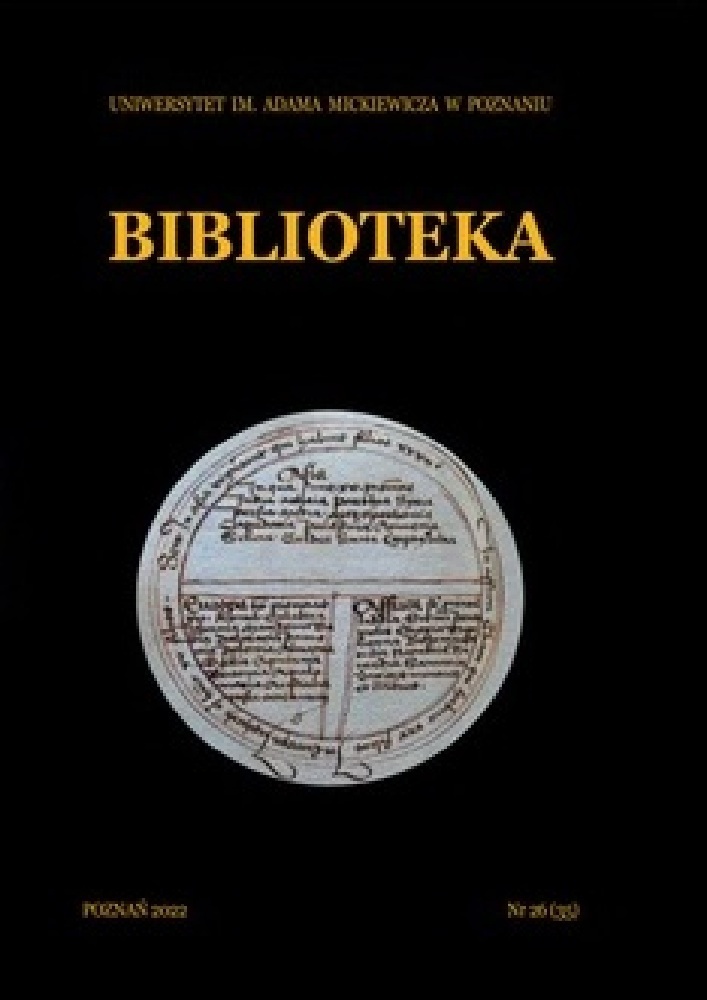Abstract
This article provides a SWOT analysis insights on Polish public libraries in the wake of the experience of the pandemic and in the light of complexity of the challenges in the efforts to consolidate the institutional resilience of libraries and their involvement in the development of this resilience within the local communities in which they operate. The phenomenon of the library resilience is discussed on the basis of currently available literature. The results of the SWOT analysis are presented, followed by the conclusions on the assessment of the resilience of the institutions under scrutiny in this study. The conclusions focus on the strengths of libraries, but also reveal the lack of any crisis management provisions and procedures and thus indicate the need for their imminent implementation.
References
Bodenheimer L., Leadership Reflections. Resiliency in Library Organizations, „Journal of Library Administration” 2018, t. 58, nr 4, s. 364–374. DOI: https://doi.org/10.1080/01930826.2018.1448651
Carpenter S.R., Arrow K.J., Barrett S., Biggs R., Brock W.A., Crépin A.S., de Zeeuw A., General Resilience to Cope with Extreme Events, „Sustainability” 2012, t. 4, nr 12, s. 3248–3259. DOI: https://doi.org/10.3390/su4123248
Featherstone R.M., Lyon B.J., Ruffin A.B., Library Roles in Disaster Response. An Oral History Project by the National Library of Medicine, „Journal of the Medical Library Association: JMLA” 2008, t. 96, nr 4, s. 343–350. DOI: https://doi.org/10.3163/1536-5050.96.4.009
Garnett J., Academic Libraries – Changing the Approach: Resilience Building against Disruptive Events and the Contribution to Disaster Risk Reduction Frameworks, „New Review of Academic Librarianship” 2021, t. 27, nr 1, s. 113–129. DOI: https://doi.org/10.1080/13614533.2019.1703767
Garnett J., Disaster Resilience Toolkit for Libraries, „Libraries & Disasters” 2021, https://librariesanddisasters.com.au/toolkit [dostęp: 23.03.2022].
Garnett J., Resilient Libraries, „Journal of the Australian Library and Information Association” 2021, t. 70, nr 3, s. 307–312. DOI: https://doi.org/10.1080/24750158.2021.1960612
Grace D., Sen B.A., Community Resilience and the Role of the Public Library, „Library Trends” 2013, t. 61, nr 3, s. 513–541. DOI: https://doi.org/10.1353/lib.2013.0008
Hanisch M., What is Resilience? Ambiguities of a Key Term, „Bundesakademie für Sicherheitspolitik” 2016, https://tinyurl.com/yc7nh436 [dostęp: 4.04.2022].
Jaeger P.T., Bertot J.C., McClure C.R., Rodriguez M., Public Libraries and Internet Access across the United States. A Comparison by State 2004–2006, „Information Technology and Libraries” 2007, t. 26, nr 2, s. 4–14. DOI: https://doi.org/10.6017/ital.v26i2.3277
Kisilowska M., Biblioteki publiczne w kryzysie: doświadczenie pierwszego etapu pandemii, Warszawa: Wydawnictwo Naukowe i Edukacyjne SBP 2021.
Lloyd A., Building Information Resilient Workers. The Critical Ground of Workplace Information Literacy. What Have we Learnt?, w: Worldwide Commonalities and Challenges in Information Literacy Research and Practice, red. S. Kurbanoğlu, E. Grassian, D. Mizrachi, R. Catts, S. Špiranec, Springer International Publishing, 2013, s. 219–228. DOI: https://doi.org/10.1007/978-3-319-03919-0_28
McAslan A., Community Resilience. Understanding the Concept and its Application. A Discussion Paper, Adelaide, Australia: Torrens Resilience Institute 2011, https://tinyurl.com/mrxdr6fd [dostęp: 21.03.2022].
McAslan A., The Concept of Resilience. Understanding its Origins, Meaning and Utility, Adelaide: Torrens Resilience Institute 2010, https://tinyurl.com/3dsm9jys [dostęp: 21.03.2022].
McAslan A., Organisational Resilience. Understanding the Concept and its Application. A Strawman Paper, Adelaide, Australia: Torrens Resilience Institute 2010, https://tinyurl.com/5n7h39xe [dostęp: 21.03.2022].
Mardis M.A., Jones F.R., Ozguven E.E., Horner M., Piekalkiewicz E., Pickett S., Mathias J., De Leon J., Rural Resiliency Hubs. An Integrated, Community-Centered Approach to Addressing the Resiliency Divide through Rural Public Libraries, 2021, https://tinyurl.com/79c5tbbf [dostęp: 4.04.2022].
Newman N., Newman D., Leadership behind Masked Faces: From Uncertainty to Resilience at a Jamaican Academic Library, „The Journal of Academic Librarianship” 2021, t. 47, z. 5. DOI: https://doi.org/10.1016/j.acalib.2021.102377
Norris F.H., Stevens S.P., Pfefferbaum B., Wyche K.F., Pfefferbaum R.L., Community Resilience as a Metaphor, Theory, Set of Capacities, and Strategy for Disaster Readiness, „American Journal of Community Psychology” 2008, t. 41, nr 1–2, s. 127–150. DOI: https://doi.org/10.1007/s10464-007-9156-6
Patin B., What is Essential? Understanding Community Resilience and Public Libraries in the United States during Disasters, „Proceedings of the Association for Information Science and Technology” 2020, t. 57, z. 1. DOI: https://doi.org/10.1002/pra2.269
Resilient Organisations, Resilience Indicators, https://tinyurl.com/4pbt2xxf [dostęp: 4.04.2022].
Shaghaei N., Tatai A., Knowles C., Morley F., Eveleigh A., Casaldàliga N., Ghesquière E., Library Resilience and Leadership in a Global Crisis, „LIBER Quarterly” 2022, t. 32, nr 1. DOI: https://doi.org/10.53377/lq.10930
Stapleton B., Steadfastly We Serve. Library Resilience during the 1918–19 Spanish Influenza Outbreak and Current COVID-19 Pandemic, „The Southeastern Librarian” 2021, t. 69, nr 1, https://tinyurl.com/47ry2sww [dostęp: 28.03.2022].
UNDRR, Resilience, 2022, https://www.undrr.org/terminology/resilience [dostęp: 23.03.2022].
Vårheim A., A Note on Resilience Perspectives in Public Library Research. Paths Towards Research Agendas, „Proceedings from the Document Academy” 2016, t. 3, nr 2. DOI: https://doi.org/10.35492/docam/3/2/12
Vårheim A., Public Libraries, Community Resilience, and Social Capital, „Information Research” 2017, t. 22, nr 1, https://tinyurl.com/5e4zcar7 [dostęp: 31.07.2020].
Veil S.R., Bishop B.W., Opportunities and Challenges for Public Libraries to Enhance Community Resilience, „Risk Analysis” 2014, t. 34, nr 4, s. 721–734. DOI: https://doi.org/10.1111/risa.12130
License
Copyright (c) 2022 Małgorzata Kisilowska-Szurmińska

This work is licensed under a Creative Commons Attribution-ShareAlike 4.0 International License.
Utwory opublikowane w czasopiśmie Biblioteka, na platformie Pressto należącej do Uniwersytetu im. Adama Mickiewicza w Poznaniu od 2015 roku są udostępniane na
licencji Creative Commons Uznanie autorstwa-Na tych samych warunkach 4.0 Międzynarodowe.
Tym samym wszyscy zainteresowani są uprawnieni do korzystania z utworów opublikowanych po 2015 roku pod następującymi warunkami:
- uznania autorstwa czyli obowiązek podania wraz z rozpowszechnianym utworem informacji o autorstwie, tytule, źródle (odnośniki do oryginalnego utworu, doi) oraz samej licencji
- na tych samych warunkach — remiksując utwór, przetwarzając go lub tworząc na jego podstawie, należy swoje dzieło rozpowszechniać na tej samej licencji, co oryginał.
Uniwersytet im. Adama Mickiewicza w Poznaniu zachowuje prawo do czasopisma jako całości (układ, forma graficzna, tytuł, projekt okładki, logo itp.).
Autor zachowuje prawa majątkowe, ale udziela zgody Uniwersytetowi im. Adama Mickiewicza w Poznaniu na wykorzystanie dzieła. Autorzy tekstów zakwalifikowanych do publikacji proszeni są o wypełnienie podpisanie i przesłanie umowy.
Jeżeli autor artykułu nie jest przekonany, że może wykorzystywać cudze utwory (np. ilustracje, fotografie, tabele) w ramach cytatu we własnej tekście musi dostarczyć do redakcji czasopisma zgodę od uprawnionych podmiotów.
Prawa są zastrzeżone do wszystkich tekstów opublikowanych przed rokiem 2015.





